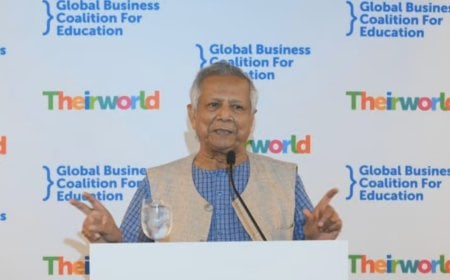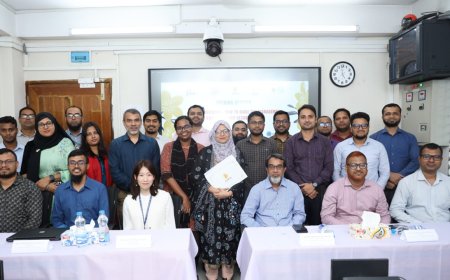China Transfers Military Technology to Bangladesh Amid Strengthening Defense Ties

China has transferred various military technologies to Bangladesh as part of Dhaka’s efforts to establish a domestic defense industrial base.
The information was revealed in a research paper titled National Image of China in Bangladesh, published on Tuesday, March 11. The study was unveiled at an event organized by the Center for Alternative at a local hotel. The event was attended by former Dhaka University professor and Executive Director of the Center for Alternative, Imtiaz Ahmed, along with Chinese Ambassador Yao Wen and other dignitaries.
The seminar, titled National Image of China in Bangladesh, commenced with a survey presentation by Professor Dr. Imtiaz Ahmed, highlighting a comparative analysis of Bangladesh-China relations over the past three years.
Former Rector of the Foreign Service Academy, Mashfee Binte Shams, emphasized the potential of Bangladesh-China relations and urged China’s assistance in resolving the Rohingya crisis. “The Rohingya issue is a matter of Bangladesh’s existence. It is widely believed that China holds significant influence over Myanmar. Therefore, China can play a role in resolving the Rohingya crisis. We hope for their cooperation in this regard,” she stated.
Professor Imtiaz Ahmed remarked, “We have been working on this for over seven years, going through all the processes of ICJ and ICC. It is now time to consider new alternatives. Given our economic capabilities, we must rethink our approach to the Rohingya issue. I believe this is the right time to implement a Marshall Plan.”
Chinese Ambassador Yao Wen stated that democracy has no fixed or universal form, as each country practices its own version of democracy. Speaking on China’s stance regarding Bangladesh, he remarked, “China will partner with the government that is formed. It is not our policy to favor any particular government or party. Our relationship is with the people of Bangladesh. We believe that, with the cooperation of major political parties, the interim government can establish a stable and prosperous Bangladesh. China’s support in this regard will continue.”
Speakers at the event stressed that beyond technological advancements, understanding China’s modernization and civilization is also crucial.
The findings on Bangladesh-China defense relations were published ahead of Chief Adviser Muhammad Yunus’s planned visit to China. If all goes as scheduled, he will visit China on March 26 and meet Chinese President Xi Jinping on March 28.
The research paper noted that Beijing has transferred technology for small and medium-sized arms such as rifles, rocket launchers, man-portable air defense systems (MANPADS), and light utility vehicles to Bangladesh Ordnance Factory and Bangladesh Machine Tools Factory to aid in the establishment of a domestic defense industrial base. Additionally, in 2012, with Chinese assistance, Bangladesh Navy incorporated its first domestically built patrol ship at Khulna Shipyard into its fleet.
According to the study, the change of power in Bangladesh in August 2024 has not affected bilateral relations. In October 2024, the People’s Liberation Army Navy (PLAN) sent its warships Qi Jiguang and Jing Gangshan to Chattogram port for a goodwill visit. The research highlighted that this visit, despite the power transition in Dhaka, symbolized the continuity of defense relations. It was also the first visit by a foreign naval vessel after the interim government took office. Furthermore, the interim government has expressed its intention to strengthen defense and security cooperation with China. At a seminar held in Dhaka in October 2024, Foreign Affairs Adviser Md. Touhid Hossain underscored the government’s commitment to continuing bilateral defense cooperation. He reaffirmed that Bangladesh seeks deeper defense ties with China and considers defense collaboration an integral part of bilateral relations.
Military Agreements
In 2002, Bangladesh and China signed a defense cooperation agreement covering military training and defense production. This agreement marked a milestone in their defense and security relations, institutionalizing cooperation instead of taking a fragmented approach. Notably, China was the first country to sign such a defense agreement with Bangladesh.
In 2014, the two nations signed four agreements on military cooperation, including one in which the People’s Liberation Army (PLA) pledged to provide the Bangladesh Armed Forces (BAF) with free training and military assistance. Another agreement stipulated that the PLA would support Bangladesh in establishing a language lab at the Bangladesh University of Professionals (BUP). Bangladesh and China have also cooperated in United Nations peacekeeping operations (UNPKOs). In May 2024, both countries conducted a historic joint military exercise, reaffirming their close defense ties.
Defense Procurement
Defense cooperation has been one of the primary pillars of Bangladesh-China bilateral relations since the formal establishment of diplomatic ties in 1975. Following the political changes in Bangladesh in 1975, China emerged as a reliable partner for military equipment and defense assistance. Many analysts believe that after 1975, Dhaka shifted away from the India-Soviet axis and leaned more towards the Pakistan-China axis. As Soviet military support declined, China stepped in to fill the void. Given Bangladesh’s strategic considerations and its historically complex relations with neighboring India and Myanmar, defense cooperation with China has become increasingly dynamic.
Between 1975 and 1980, Chinese defense assistance became central to bilateral relations, with China supplying 78% of Bangladesh’s military hardware during that period.
According to the research report, Bangladesh is currently the second-largest buyer of Chinese arms. From 2019 to 2023, Bangladesh accounted for 11% of China’s total arms exports. Ranked as the world’s 26th-largest arms importer, Bangladesh purchased approximately 72% of its total arms from China between 2019 and 2023. The Stockholm International Peace Research Institute (SIPRI) reports that from 2010 to 2019, Bangladesh spent $2.59 billion on Chinese weaponry. Dhaka has acquired significant military assets from Beijing, including maritime patrol vessels, corvettes, tanks, fighter jets, and both surface-to-air and anti-ship missiles.
The Bangladesh Army operates advanced Chinese weaponry such as VT-5 light tanks and MBT-2000 main battle tanks. The Bangladesh Air Force has introduced modern Chinese trainer jet fighters like the K-8 and short-range air defense missile systems like the FM-90. The Bangladesh Navy has procured a pair of Chinese Ming-class submarines worth $205 million and next-generation Type 056 stealth corvettes for its surface fleet.
Unconditional Sales
The research report highlights that China imposes no political conditions on arms sales to Bangladesh, unlike some other suppliers. This allows Bangladesh to acquire crucial military hardware that might otherwise be unavailable from alternative sources.
Bangladesh’s ambitious military modernization initiative, Forces Goal 2030, has significantly benefited from defense cooperation with China, solidifying Beijing as Dhaka’s primary defense partner. Due to historical familiarity, tradition, and preference, Bangladesh’s armed forces continue to procure modern Chinese weaponry. Additionally, China offers high-tech military equipment at comparatively lower costs than many other countries.
Both nations have displayed a positive and constructive approach toward enhancing collaboration in peacekeeping, development, and conflict resolution. From the early years of their bilateral relationship, arms procurement and supply have been integral to defense cooperation. Over time, defense collaboration has evolved beyond arms sales into a more comprehensive strategic partnership, as noted in the research findings.









































































































































































































